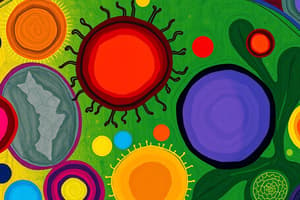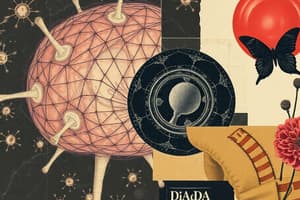Podcast
Questions and Answers
Who was the first to observe living cells and referred to them as 'Animalcules'?
Who was the first to observe living cells and referred to them as 'Animalcules'?
- Theodore Schwann
- Matthias Schleiden
- Antonie van Leeuwenhoek (correct)
- Rudolf Virchow
What did Matthias Schleiden conclude about plant cells?
What did Matthias Schleiden conclude about plant cells?
- They are similar to animal cells.
- All plants are made of cells. (correct)
- Plant cells have a different structure than animal cells.
- They come from non-living matter.
Which statement accurately reflects a part of the modern cell theory?
Which statement accurately reflects a part of the modern cell theory?
- Cells are the largest unit of life.
- All living organisms are composed of cells. (correct)
- Plant and animal cells are identical in structure.
- Cells arise from non-living matter.
Who is credited with first using the term 'cell' after viewing them through a microscope?
Who is credited with first using the term 'cell' after viewing them through a microscope?
What important discovery did Rudolf Virchow contribute to cell theory?
What important discovery did Rudolf Virchow contribute to cell theory?
What is one of the lesson objectives related to the cell theory?
What is one of the lesson objectives related to the cell theory?
Which activity involves comparing pictures to analyze differences between types of cells?
Which activity involves comparing pictures to analyze differences between types of cells?
What is a key aspect of the cell theory that students are expected to explain?
What is a key aspect of the cell theory that students are expected to explain?
Which health guideline is emphasized before starting class activities?
Which health guideline is emphasized before starting class activities?
What does the class prayer aim to fill the classroom with?
What does the class prayer aim to fill the classroom with?
Flashcards are hidden until you start studying
Study Notes
Health and Safety Reminders
- Always wear face masks.
- Frequently sanitize hands, or use alcohol.
- Avoid unnecessary conversations with seatmates.
- Keep mobile phones and gadgets temporarily aside.
Class Routine and Environment
- Class prayer emphasizes joy, learning, kindness, peace, and love.
- Participation check: 'Who’s IN? Who’s OUT?'
Lesson Objectives
- Identify contributions of various scientists to cell theory.
- Explain postulates of cell theory and modern cell theory.
- Curriculum focus: Explain postulates of the cell theory (STEM_BIO11/12-Ia-c-1).
Activity 1: Compare and Analyze
- Analyze pictures to observe differences in cell types.
- Discuss reasons for distinct differences between various types of cells.
Activity 2: Scientist Contributions Table
- Arrange contributions of key scientists related to cell theory:
- Robert Hooke (1665): First to view the cell using a microscope and coined the term "cell".
- Antonie van Leeuwenhoek (1676): Observed the first living cells, referred to as "animalcules".
- Matthias Schleiden (1838): Concluded that all plants are made of cells, emphasizing similar composition.
- Theodore Schwann (1839): Stated that animal cells differ from plant cells and contributed to the understanding of RBCs.
- Rudolf Virchow (1855): Proposed that cells arise from pre-existing living cells, forming the third part of cell theory.
Cell Theory Overview
- Fundamental concept in biology explaining that:
- All living organisms are composed of cells.
- The cell is the basic unit of life.
- All cells arise from other living cells.
Modern Cell Theory
- Builds upon the original cell theory by incorporating new scientific findings and technologies.
- Emphasizes the importance of cellular processes and functions in understanding life.
Activity 3: Personal Application
- Relate concepts of cell theory to everyday life scenarios.
Wrap-up and Enrichment
- Summarize the lesson using a diagram highlighting the postulates of the cell theory and modern modifications.
- Encourage students to study cell parts and their functions in depth as enrichment activity.
Studying That Suits You
Use AI to generate personalized quizzes and flashcards to suit your learning preferences.




